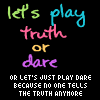In “Learning by Heart,” writer Roland Barth ponders a 4-word sentence (as opposed to a 4-letter word) that used to irritate him when he was a teacher and later, an administrator. According to Barth, "They'll never let us." was the 4-word sentence that frequently was uttered by teachers whenever someone came up with a new idea. Barth attacked that catch-all phrase with vengeance explaining, “They'll never let us was a wet blanket against which we fought in the struggle to maintain enthusiasm. I never knew who ‘they’ were, nor did I ever care to find out...”
As a technology integration proponent, I often find myself stuck in a culture of "They'll never let us" or a place where the outcry, “We Cannot Do…” pervades (which actually means “our school doesn’t have up-to-date technology, so we can’t use technology in meaningful ways with our students”).
Speaking Up
Coming Soon! Submit your own comments about Brenda's Blog!
As real as the “digital divide” is, the term never was intended to be used as an excuse for doing nothing. Roland Barth suggests that the responsibility to improve schools from within ultimately rests on the shoulders of the schoolhouse and the educators who reside there. It’s up to us, says Barth, to get past the “cautious, resistant, fearful ‘other’ that resides within each of us before confronting the ‘others’ who are without.”
Today, I read an article about an educator who did just that. Sheryl Nussbaum-Beach is a computer resource specialist who refused to let the digital divide stop her from preparing the students in her high-needs school for the 21st century. Nussbaum-Beach has made it her business to be an advocate for those students, believing that neglecting to give students opportunities to use technology “only deepens the digital divide and puts them at yet another disadvantage when competing for jobs in the future” and suggesting that overlooking the integration of technology into content areas of instruction is just “one more way to keep the have-nots... the have-nots.” Nussbaum-Beach’s work is fueled by her belief that as an educator she has “a moral responsibility to get the kids on [her] watch technology access” and proposes that the realities of the digital divide should motivate teacher leaders to operate “as agents of change, advocating what is in the best interest of their students.”
For more on Sheryl Nussbaum-Beach, see the Education World article Traveling the Techno Trail: Training Teachers to Use Technology.
Trying to incorporate technology into a program riddled with time restrictions, lack of teacher skills and Pentium I- Windows 95 computers can be a daunting task, but if we take on Roland Barth’s challenge to “think otherwise” or Sheryl Nussbaum-Beach’s charge to be an agent of change, the implications are endless for those stuck in the digital divide. In the midst of an environment full of “they'll never let us" and “we cannot do…,” perhaps we need to pay heed to the warning issued many years ago by Pogo, the little opossum from Walt Kelly's comic strip: “We have met the enemy and he is us."
Who Is Brenda?
Brenda Dyck is a sessional instructor at the University of Alberta, in Edmonton, Alberta (Canada). In addition to teaching preservice teachers, Brenda is the moderator of MiddleTalk, a listserve sponsored by the National Middle School Association (NMSA). Her "HotLinks" column is a regular feature in NMSA's magazine, Middle Ground. Brenda also is a teacher-editor for MidLink magazine.
Author Name: Brenda Dyck
Education World®
Copyright © 2006 Education World
Friday, June 15, 2007
Teaching in a Culture of…
Subscribe to:
Post Comments (Atom)






2 comments:
Thanks for the nice mention Toto. If you would like to link to my blog and keep up with my current adventures in helping high needs populations get a voice at the digital table feel free to visit my blog. I'd love to hear more of your thoughts.
Thank you very much for sharing your thoughts. It is always great pleasure to read your posts.
Post a Comment